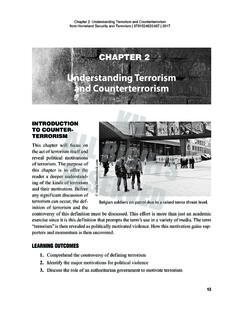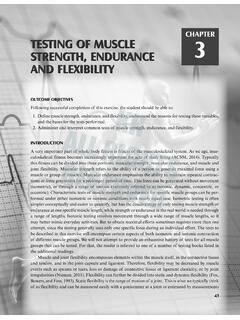Transcription of The Importance of Ethics in Criminal Justice
1 17 CHaPTer 2 I count him braver who overcomes his desires than him who conquers his enemies, for the hardest victory is over self. AristotleThe Criminal Justice system is arguably one of our most important public service systems. Certainly, it is one of the systems the public is likely to interact with on a daily basis. Often, those employed by the Criminal Justice system are forced into situations in which they must make individualized and quick decisions decisions that could have detrimental or even fatal outcomes. Without proper training or proper analytical or reasoning skills, law enforcement, legal professionals, or corrections officers could find themselves forced to recover from the fallout of poor decision making.
2 As a pub-lic works system that is tasked with protecting and defending the public from crime and the dangers crime presents, the Criminal Justice system has an obligation to have and maintain all of the tool sets it might need to be capable of handling these situations to the absolute best of its ability. The study of Ethics presents an opportunity for the Criminal Justice system to give its members such an abstract tool set. Ethics , at its simplest, is philosophy that is interested in the study of questioning what is right and what is wrong. The study of Ethics presents a more complicated understanding of the philoso-phy, but it still stands as a basic building block with which the Criminal Justice system can ensure, to the best of its ability, that its public servants have a method of determining what is right and what is wrong.
3 Of course, from an academic perspective, further understanding of Ethics is necessary to fully develop a curriculum to teach the public servants of the Criminal Justice system. First, however, it is necessary to establish why Ethics is this example ..You have just completed training at the police academy and you are on a ride along in a suburban neighborhood with your FTO (Field Training Officer), Officer Jones. The day is rather quiet and a fellow officer going in the opposite direction stops to exchange casual conversation about the day while you attentively observe the people and surroundings. A car stops to allow two children riding their bikes to cross the street, then continues after the children safely cross the street.
4 Your FTO does not realize that there is not a stop sign because the car commands attention it is quite flashy, with new rims and dark tint on the windows. The FTO views the vehicle as suspicious because he knows the neighborhood and has not seen this car before. He stops the car and you observe as the FTO The Importance of Ethics in Criminal JusticeChapter 2: The Importance of Ethics in Criminal Justice Ethics in the Criminal Justice System | (c)2015 | 978-1-4652-7606-3 | Ethics in The Criminal Justice Systemwalks to the passenger side of the vehicle. The driver is an African American male with his son they are going home from the neighborhood convenience store.
5 You notice that your FTO s tone is abrasive as he asks the age of the driver s son. The other offi-cer casually pulls behind the squad car driven by the FTO and smirks as your FTO takes a seemingly aggressive posture towards the driver and his son. Afterwards, he runs the license and insurance of the driver. Everything is valid. The driver s wife, going by in her car, sees what is happening and pulls over to ask what is going on. Your FTO sharply instructs her mind her business and stay in her vehicle. The driver and his wife adamantly explain to the officer that there is not a stop sign and he stopped to yield the right of way to the children riding their bikes in the neighborhood.
6 The driver and his wife explain that they just bought a home in the quiet suburb and are both employed by the nearby college. Your FTO proceeds to write the driver a ticket for failure to stop at a stop sign. The driver grudgingly accepts the ticket, and he and his wife drive away in their cars. Your FTO remarks, You can never be too careful about those types of people. You are caught off guard by the FTO s comment, yet quietly feel bad because of his actions. Your FTO then goes to explain, It s citation time and a little slip here or there won t hurt anyone. Welcome to the team, rookie it s okay to cut a few corners.
7 Remember, you are a rookie and you do not want to ruffle any feathers within the precinct especially not on your first day on the job. First of all, were the FTO s actions ethical ? Second, whether the actions were or were not ethical , what do you do? Importance of Ethics and ethical deCIsIons In Criminal JustICeThe Criminal Justice system maintains its own system of values that is distinct from other fields and occupations. Additionally, the Criminal Justice system in many aspects can be referred to as a subculture that maintains a distinct set of rules and regulations, codes, and symbols ( , firearms, uniforms, badges) with rules that differ from those in mainstream society.
8 Coser (1974) expounds the notion of the Criminal Justice profession by comparing it to a greedy institution, meaning that the institution itself does not literally intend to incarcerate every individual, but it seeks the unmiti-gated commitment to the profession while navigating through a wider social context. Additionally, it demands total allegiance to the institution yet mentally severs its members ties from institutions that are in conflict with its function ( , family and community). The Criminal Justice institutions must establish specific guidelines and must reinforce a myriad of ideas that directly impact the legit-imacy of the law enforcement apparatus in an ever-changing society.
9 Specific rules, regulations, and sanctions must be adhered to in order to maintain structure and order among and between individ-uals whom the law enforcement community must govern. Individuals who work within the legal community, especially law enforcement, are not far displaced from the average individual. Humans by nature are imperfect. Possibly, then, great value must be placed upon a strong ethical foundation to carry out the mission of law enforcement. Philosophers such as Plato have made the argument that ethical behavior is a set of ideas that cannot be taught but rather it is an essential element that is taught throughout an individual s upbringing.
10 Even the most ethical person might argue that ethi-cal behavior would be difficult to measure because ethical decision making varies by the individual; in fact, each person maintains a different set of values that they bring to their occupation. Moral reasoning is a key element that is fundamental to understanding Value of Ethics to maintain CivilityRokeach (1973) and Zho, He, & Lovrich (1998) would agree that a society would not maintain order if a sense of utility was absent. Behaviors vary amongst individuals as well as cultures, therefore members of society must agree upon what is best for the entire group to establish structure and order to achieve a desirable means to an end.

















